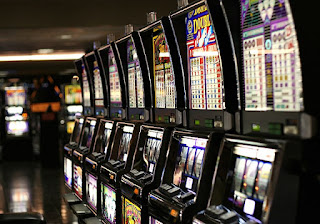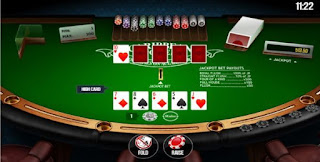More Intricacies Related to Counting Cards in Blackjack
The end I showed up at in that post is that card counting is more straightforward than a many individuals think, yet it's still moderately hard contrasted with most undertakings. 카지노사이트
Here, I will get into a portion of different complexities associated with counting cards. You could presumably bring in some cash by perusing something like that first post, yet you can improve assuming you become more familiar with a portion of the intricacies in question.
Step by step instructions to Practice Counting Cards
I will propose that you stay with the hello there lo card including framework I depicted in my last post. These are the cards and values for that framework:
Any 2, 3, 4, 5, or 6 considers +1.
Any ace or card worth 10 considers - 1.
You have an aggregate of 6 cards worth +1 each, and you have a sum of 6 cards worth - 1 each. On the off chance that you count through a deck of cards utilizing this framework, you'll begin with 0, however since the count is adjusted, you'll likewise end with 0.
The initial phase in figuring out how to count cards is to rehearse at home by counting through a solitary deck of cards. You'll have a sensibly smart thought of how well you're doing by whether you end up with 0. Assuming you have one more count toward the finish of the deck, you've committed an error.
Simply go through the deck each card in turn staying aware of the running count. When you get to where you can end up with 0 toward the finish of each count, you can fire attempting to speed things up with a stopwatch or something to that affect.
Another stunt is to begin managing the cards out 2 all at once, then 4 all at once, etc. You'll begin to perceive cards which counterbalance themselves in these pairings. This will make you much quicker.
You ought to have the option to count through a whole deck of cards in under a moment and end up with 0 toward its finish.
When you can do that, begin adding interruptions. Turn the radio up. Put the TV on. Urge the children to play in a similar room as you count cards.
While you're including cards in a gambling club, you'll should have the option to do as such without being diverted by the tangible over-burden there. Remember you should have the option to stay aware of the count without offering it that you're counting. You can't be moving your lips, seem as though you're focusing hard, or whatever else of that nature. 안전한카지노사이트
Rehearsing at home in a calm room will not set you up for a gambling club climate.
Straying From Basic Strategy Based on the Count
I realize I've referenced that the primary way you get an edge playing blackjack for genuine cash is by changing the size of your wagers in view of the count.
Be that as it may, you can (and ought to) likewise veer off from fundamental procedure when justified.
Here is a model:
Assume you have a hard absolute of 16, and the essential methodology proposes that you ought to hit experiencing the same thing.
In any case, you realize the deck is proportionately wealthy in 10s on the grounds that the count is so certain.
Assuming you're speculating that you ought to remain all things considered, you're correct.
The deviations from fundamental procedure in view of the count are classified "files."
You can think of an almost boundless number of circumstances where you'd veer off from essential methodology in view of the count, yet a ton of them come up so seldom it isn't worth the effort to know what to do.
For instance, how frequently would you say you will play in a game where the count is +9?
The fundamental circumstances where you want to digress are designated "the renowned 18" and "the remarkable 4."
Representing Variations in Casino Rules and Conditions
You'll observe a lot of blackjack articles that notice that the house edge is 0.5%. You'll see some that utilization the number 1%, all things being equal. Reality, however, is that the edge depends on the standards and game circumstances set up where you're betting.
If you're new to blackjack or counting cards, you could believe that the distinction in game circumstances isn't simply significant. You'd be off-base, however - each 10th of a rate point in assumption counts.
Expect that the standard blackjack game is unified with 8 decks, where the seller hits a delicate 17, and you're permitted to twofold after split. The house edge for this game, assuming you utilize amazing blackjack system, is around 0.64%. Whenever you change the accompanying standards, the house edge changes by the sum recorded:
A solitary deck game has a house edge of around 0.48% better. Assuming the wide range of various guidelines were something similar, the house edge for this game would drop to 0.16%, which is probably as near a make back the initial investment game as you'll find in a club. Indeed, even a twofold deck game altogether affects the house edge - 0.19%.
On the off chance that you're permitted to take early acquiescence against a 10, you get 0.24% back. (The default decides above accept that give up isn't a choice.)
In the event that you can twofold down on quite a few cards (rather than simply having the option to twofold down on your underlying 2 cards), you get 0.23%.
If the seller needs to remain on a delicate 17, you get 0.22% from that, as well.
Being permitted to resplit experts gives you 0.08%.
Being permitted to take late acquiescence is additionally worth 0.08%.
Those are rules conditions you might want to find. Different standards changes can make the house edge higher, as follows:
On the off chance that blackjack just pays even cash, the house edge increments 2.27% for the house. This isn't normal.
A 6/5 blackjack game, however, IS normal, it actually devastatingly affects your chances. It adds 1.39% to the house edge.
If that you're simply permitted to twofold down on 10 or 11, you lose 0.18% to the house.
In the event that you're not permitted to twofold subsequent to parting, you lose 0.14%.
Assuming you're simply permitted to part once (no re-parting), you lose another 0.10%.
Remember that conditions don't simply change from one club to another. They frequently fluctuate from one table to another, particularly while you're playing at tables with various cutoff points.
Whole books enjoy been about benefit betting with card counting, and you can unfortunately go into a limited amount a lot of profundity in a solitary blog entry.
This post has dove into a portion of the stuff past the rudiments framed in the primary post of this series.
Remain tuned for additional posts that will cover significantly more subtleties that make a difference to card counters. 온라인카지노




Comments
Post a Comment